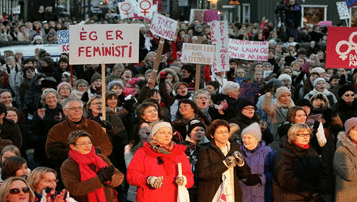Social Equality
Why in the news?
- Thousands of women and non-binary folk in Iceland stopped work both paid and non-paid, bringing the nation to a standstill for 24 hours.
- It’s the first of its kind since the historic strike of 1975.
- Fishing industry workers, teachers , hospital staff, government workers, librarians and Prime Minister Katrin Jakobsdottir were among those who were protesting the gender pay gap and gender-based violence .
The Case
- Iceland has been ranked the world’s most gender-equal country for 14 years in a row by the World Economic Forum (WEF), which measures education, pay, healthcare and other factors.
- Background: Iceland, in 2018, became the first country in the world to mandate equal pay for equal work by law. However, implementation and enforcement are ongoing challenges.
- Icelandic women, led by labor unions and feminist organizations, have taken collective action to demand their rights and hold employers accountable for gender pay disparities.
Scenario in India
- India ranked 127th out of 146 countries in the Gender Gap Report 2023 edition.
- As of February 2021, only 14.4% of seats in parliament were held by women.
- Government Initiatives to promote Gender Equality:
- Legal Reforms: India has enacted several laws to protect women’s rights, such as the Protection of Women from Domestic Violence Act and the Sexual Harassment of Women at Workplace Act.
- Beti Bachao, Beti Padhao: This campaign focuses on the welfare of the girl child and aims to address issues like female feticide and promote girls’ education.
- Pradhan Mantri Matru Vandana Yojana: A maternity benefit program aimed at providing financial assistance to pregnant and lactating women.
- Reservation in Local Bodies: The government has introduced a 33% reservation for women in Panchayati Raj Institutions.
- Women Reservation Bill 2023: seeks to allocate 33 percent of the seats in the directly elected Lok Sabha and state legislative assemblies for women.




